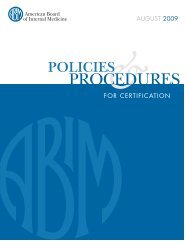The SRA Symposium - College of Medicine
The SRA Symposium - College of Medicine
The SRA Symposium - College of Medicine
Create successful ePaper yourself
Turn your PDF publications into a flip-book with our unique Google optimized e-Paper software.
Papers<br />
<strong>The</strong> Development, Implementation and Evaluation <strong>of</strong> a<br />
Prospective Research Monitoring Program<br />
Philip A. Cola, MA, Principal Author<br />
Center for Clinical Research<br />
University Hospitals <strong>of</strong> Cleveland<br />
11100 Euclid Avenue<br />
Cleveland, OH 44106, USA<br />
(216) 844-5568<br />
Philip.Cola@uhhs.com<br />
Carol Fedor, ND, CCRC, Co-Author<br />
Center for Clinical Research<br />
University Hospitals <strong>of</strong> Cleveland<br />
11100 Euclid Avenue<br />
Cleveland, OH 44106, USA<br />
(216) 844-5568<br />
Carol.Fedor@uhhs.com<br />
and<br />
Louise Haffke, RN, MPH, Co-Author<br />
Center for Clinical Research<br />
University Hospitals <strong>of</strong> Cleveland<br />
11100 Euclid Avenue<br />
Cleveland, OH 44106, USA<br />
(216) 844-5568<br />
Louise.Haffke@uhhs.com<br />
Authors Note:<br />
<strong>The</strong> opinions in this paper are those <strong>of</strong> the authors and do not reflect the <strong>of</strong>ficial policy <strong>of</strong> the Center<br />
for Clinical Research, University Hospitals <strong>of</strong> Cleveland. Mr. Philip Cola is the corresponding<br />
author and can be contacted as above.<br />
Abstract:<br />
Historically, monitoring <strong>of</strong> clinical research predominantly occurred in industry-funded studies<br />
through which Clinical Research Coordinators (CRCs) and Principal Investigators (PIs) were<br />
audited by external sponsor-provided “monitors”. <strong>The</strong> purpose <strong>of</strong> this paper is to evaluate preliminary<br />
results <strong>of</strong> an internal pilot prospective monitoring program. This program was developed<br />
and implemented to proactively enforce responsible conduct <strong>of</strong> research, to monitor the informed<br />
consent process, to serve as a support service to CRCs and PIs, to ensure clinical research data<br />
integrity, and to investigate overall research compliance. This program differs from the historical<br />
monitoring model in its prospective informed consent monitoring, its internal implementation<br />
and relationship to the Institutional Review Board (IRB) for compliance matters, its attempt to<br />
proactively improve data integrity, and its potential to monitor clinical research that is not currently<br />
audited (i.e., certain Federally or Foundation-sponsored or investigator-initiated trials).<br />
66 2005 <strong>Symposium</strong> Proceedings Book

















